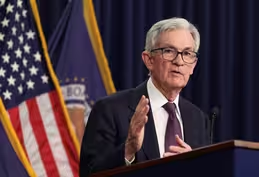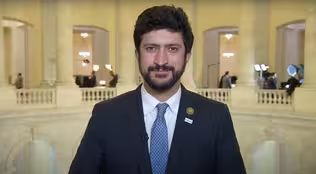
U.S. astronauts stranded in space face another delay
Clip: 12/18/2024 | 6m 10sVideo has Closed Captions
U.S. astronauts stranded in space face another delay before they can return to Earth
A pair of NASA astronauts who have been stuck at the International Space Station since June will have to wait a little longer to come back to Earth. NASA says astronauts Butch Wilmore and Suni Williams won’t return now until late March or even April, which means they will have lived and worked in orbit for more than nine months. Science correspondent Miles O’Brien reports.
Problems playing video? | Closed Captioning Feedback
Problems playing video? | Closed Captioning Feedback
Major corporate funding for the PBS News Hour is provided by BDO, BNSF, Consumer Cellular, American Cruise Lines, and Raymond James. Funding for the PBS NewsHour Weekend is provided by...

U.S. astronauts stranded in space face another delay
Clip: 12/18/2024 | 6m 10sVideo has Closed Captions
A pair of NASA astronauts who have been stuck at the International Space Station since June will have to wait a little longer to come back to Earth. NASA says astronauts Butch Wilmore and Suni Williams won’t return now until late March or even April, which means they will have lived and worked in orbit for more than nine months. Science correspondent Miles O’Brien reports.
Problems playing video? | Closed Captioning Feedback
How to Watch PBS News Hour
PBS News Hour is available to stream on pbs.org and the free PBS App, available on iPhone, Apple TV, Android TV, Android smartphones, Amazon Fire TV, Amazon Fire Tablet, Roku, Samsung Smart TV, and Vizio.
Providing Support for PBS.org
Learn Moreabout PBS online sponsorshipGEOFF BENNETT: A pair of NASA astronauts who have been stuck at the International Space Station since June will have to wait a little longer to come back to Earth, as they wait once again for a new capsule to send in their replacements.
NASA says astronauts Butch Wilmore and Suni Williams won't return now until late March or even April, which means they will have lived and worked in orbit for more than nine months.
We're joined now by our science correspondent Miles O'Brien.
So, miles, this voyage was supposed to last about a week.
Remind us why Butch Wilmore and Suni Williams have now been on the ISS for so long.
MILES O'BRIEN: Yes, talk about a holdover.
It's pretty extraordinary, isn't it, Geoff?
They arrived at the International Space Station a spaceship manufactured by Boeing called the Starliner.
The arrival did not go well.
There were all kinds of problems with thrusters that fired when they shouldn't, things that got stuck, things that failed outright.
And NASA became very concerned about whether those thrusters would do as they were supposed to on reentry, where it is very critical that they do things precisely on time, precisely as designed.
They couldn't get comfortable with what was causing the problem, even though they tried to simulate things on the ground.
And so, in the end, NASA Administrator Bill Nelson decided it was not safe to return that capsule with human beings on board.
It ended up landing without incident, but it was, in his case, Nelson's case, the better part of valor to leave them aboard.
But, boy, it's been a long run for them.
GEOFF BENNETT: We know that Williams and Wilmore are veteran astronauts, but, still, what are the long-term psychological and health effects of those prolonged stays in space?
MILES O'BRIEN: There's a lot to unpack here.
They are both veterans.
They're both troopers.
They have completely assimilated with the crew and have been doing the tasks that astronauts do up there.
But over the course of time, human beings who spend that much time in microgravity encounter all kinds of muscle and bone loss because you're not using them.
Your cardiovascular system doesn't have to work as hard.
And so that becomes a problem when you land.
Believe it or not, Geoff, the fluids change so much, the distribution of fluids in your body, is such that you get pressure on your cornea, and that can cause long-term vision problems.
And then, of course, there's the psychological stress and stress in general, which can actually impede your entire system and its ability to fight off disease.
So there's a host of issues that crop up.
It's not unknown.
There are a lot of people that have spent long stints in space.
NASA continues to learn about this with an eye towards sending human beings toward Mars.
But this will be one more set of data in the book.
GEOFF BENNETT: Let's shift our focus to some broader NASA issues, specifically about president-elect Trump's nominee for NASA administrator, Jared Isaacman.
Why has he been nominated for this role?
MILES O'BRIEN: Jared Isaacman, who is a 41-year-old billionaire who dropped out of high school and began a payments company called Shift4 now in his basement, his parents' basement, is a very close associate of Elon Musk.
As a matter of fact, after NASA, he's probably Elon Musk's -- one of the Elon Musk's better customers.
He's purchased two space flights so far, both of them orbital, and in one case becoming the first civilian on a civilian space flight to conduct a space walk.
So he is a space enthusiast.
He is a pilot who has collected a whole fleet of fighter aircraft and truly believes in the commercialization of space and is a big believer in the mission of SpaceX, clearly, and Elon Musk's goals to ultimately send human beings to Mars.
So he comes to NASA with a strong bent toward commercialization, which is the general trend that NASA has been heading in anyway.
GEOFF BENNETT: And, Miles, I know you interviewed him before all of this for some work that you did for the National Business Aircraft Association.
What does his nomination suggest about the future of NASA?
MILES O'BRIEN: Well, clearly, NASA will be heading into the commercial direction.
There is no doubt about that.
Some of the unknowns are, what is Jared Isaacman's thoughts, for example, on climate change?
A big portfolio for NASA are Earth-observing satellites, which are used by scientists to measure the effects of the climate emergency.
And he's said precious little about that.
He did offer up one tweet not long ago where he said, it's a false choice to say you have to make a choice between space exploration and fixing the climate on Earth.
Beyond that, we don't know much about that.
The science mission of NASA is important.
He has proposed a mission to use a SpaceX Starship to go and re-boost the Hubble space telescope, which NASA has rebuffed.
That might change.
And then, ultimately, Geoff, he's going to have to make a decision on whether to continue with that Boeing Starliner capsule, which brought Suni Williams and Butch Wilmore to the space station.
Will it ever fly again for NASA?
You could say there's a conflict of interest here, given his close association with SpaceX and Elon Musk, given that that is the alternative to the Boeing spaceship.
So, lots of questions about how much Elon Musk will have a say in the space program.
Clearly, his imprint will be all over it, one way or another, using Jared Isaacman in that role.
GEOFF BENNETT: Miles O'Brien, our thanks to you, as always.
MILES O'BRIEN: You're welcome.
Fed lowers interest rates again but future cuts in question
Video has Closed Captions
Clip: 12/18/2024 | 5m 34s | Fed lowers interest rates again but inflation concerns make future cuts uncertain (5m 34s)
Rep. Casar on progressive caucus effort to rebrand Democrats
Video has Closed Captions
Clip: 12/18/2024 | 6m 15s | Rep. Greg Casar outlines progressive caucus efforts to rebrand Democratic Party (6m 15s)
Syrians attempt to uncover fate of Assad's prisoners
Video has Closed Captions
Clip: 12/18/2024 | 3m 36s | Syrians attempt to uncover fate of thousands detained and feared murdered under Assad (3m 36s)
Syrians face horrors at site of Assad's chemical attack
Video has Closed Captions
Clip: 12/18/2024 | 8m 34s | Amid new freedoms, Syrians face horrors at site of Assad's 2013 chemical weapons attack (8m 34s)
Trump tells GOP to reject government funding bill
Video has Closed Captions
Clip: 12/18/2024 | 5m 56s | Trump tells GOP to reject funding bill that would avoid a government shutdown (5m 56s)
Why a promising treatment for alcohol abuse is barely used
Video has Closed Captions
Clip: 12/18/2024 | 10m 21s | Why a promising treatment for alcohol abuse is barely used (10m 21s)
Providing Support for PBS.org
Learn Moreabout PBS online sponsorship
- News and Public Affairs

FRONTLINE is investigative journalism that questions, explains and changes our world.

- News and Public Affairs

Amanpour and Company features conversations with leaders and decision makers.












Support for PBS provided by:
Major corporate funding for the PBS News Hour is provided by BDO, BNSF, Consumer Cellular, American Cruise Lines, and Raymond James. Funding for the PBS NewsHour Weekend is provided by...





